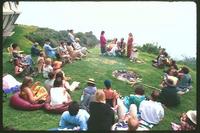| Dialogue | 2004-05-22 08:35 5 comments |
 by Flemming Funch by Flemming FunchI'm missing dialogue. Dialogue as per the principles outlined by David Bohm. See Dialogue - a Proposal. I used to be in a dialogue group that met once per month for half a day. Run by the people from The Dialogue Group. Dialogue done this way is something unique, very specific, but yet strangely nebulous. It is a gathering that doesn't have any direct purpose or aim. Nobody's trying to "accomplish" anything or to gain agreement or to arrive at an outcome. One sits down in a circle, quiet at first, and then when somebody feels inspired to speak, one speaks. When they're done, when somebody else feels inspired to speak, they do so. What others said forms part of your impetus to talk, but you aren't directly answering the others. Everybody focuses what is in the "middle" of the circle. We're in a way talking about the same thing, but without having agreed on what that is, and without any requirement to agree. We're kind of talking about what we see, what we experience. We can explore our assumptions, ideas and feelings. And, magically, it leads somewhere. Not necessarily a neat result, and it is hard to say what exactly came of it, but something will. It is a different kind of space than what one finds just about anywhere else. It is free, real, authentic. People are present. Where it goes is entirely open. Dialogue, as we are choosing to use the word, is a way of exploring the roots of the many crises that face humanity today. It enables inquiry into, and understanding of, the sorts of processes that fragment and interfere with real communication between individuals, nations and even different parts of the same organization. In our modern culture men and women are able to interact with one another in many ways: they can sing dance or play together with little difficulty but their ability to talk together about subjects that matter deeply to them seems invariable to lead to dispute, division and often to violence. In our view this condition points to a deep and pervasive defect in the process of human thought.Here are some other links, with much material: Bohm Dialogue Dialogue and Conversation UIA Dialogue Links Global Dialogue Institute Open Forum I haven't seen much real dialogue happen online. At least only rarely. But some of what works well with weblogs leans in that direction. Where you can just state what's on your mind, what's going on, without having to worry much about what others will think or whether what you say corresponds properly to what others are saying. But when it works, we might talk into the same space. |